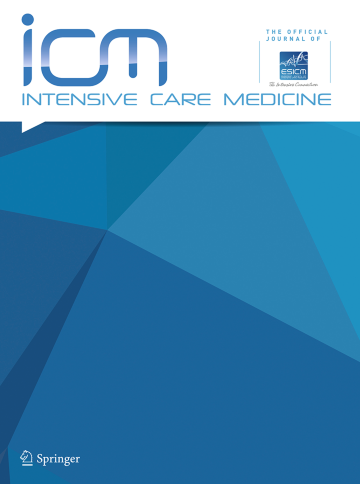Determinants of ICU memories and the impact on the development and trajectory of post-traumatic stress symptoms: a multicenter longitudinal cohort study.
IF 21.2
1区 医学
Q1 CRITICAL CARE MEDICINE
引用次数: 0
Abstract
PURPOSE To identify demographic and clinical determinants of memory formation in intensive care unit (ICU) patients, and determine the relationship between ICU memories and the development and trajectory of post-traumatic stress disorder (PTSD) symptoms. METHODS Adult patients (n = 426) from two Dutch University ICUs underwent a structured telephone interview using the validated ICU-Memory Tool (ICU-MT) 3 months post-ICU and were assessed for symptoms of PTSD using the Impact of Event Scale (IES-6) at 3 and 12 months post-ICU. RESULTS Factual memories without delusional memories were present in 47.7% (n = 203), complete ICU amnesia in 13.8% (n = 59), and delusional memories in 38.5% (n = 164) of patients. Delirium was present in 41% (n = 68) of patients with delusional memories. Using multinomial logistic regression, female sex and number of days with deep sedation were associated with ICU amnesia (aOR 1.99, 95% CI 1.04-3.81, and aOR 1.34, 95% CI 1.09-1.65, respectively), whereas delirium and length of ICU stay were associated with delusional memories (aOR 1.94, 95% CI 1.04-3.61, and aOR 1.11, 95% CI 1.02-1.21, respectively). Of 250 patients assessed at both time points, the prevalence of PTSD symptoms increased significantly over time (4.5 to 10.0%, p < 0.01), driven by a significant increase among those with delusional memories (6.7 to 18.1%, p < 0.01). In a linear mixed-effects model, delusional memories were independently linked to both 3- and 12-month symptoms of PTSD (vs. factuals, adjusted %-difference in mean IES score, 12.9%, 95% CI 2.6-24.1%, and 18.1%, 95% CI 5.2-32.5%, respectively). CONCLUSIONS Female sex and prolonged deep sedation were associated with complete ICU amnesia, whereas a longer ICU stay and delirium were associated with delusional memories, although these memories were also common in those without delirium. Delusional memories were independently linked to the development and persistence of PTSD symptoms. Targeted interventions to mitigate memory disturbances, both during and after the ICU, may help alleviate the psychological impact of critical illness.ICU记忆的决定因素及其对创伤后应激症状发展和轨迹的影响:一项多中心纵向队列研究
目的探讨重症监护病房(ICU)患者记忆形成的人口学和临床影响因素,并探讨ICU记忆与创伤后应激障碍(PTSD)症状发展轨迹的关系。方法来自两所荷兰大学icu的成年患者(n = 426)在icu后3个月使用经过验证的icu -记忆工具(ICU-MT)进行结构化电话访谈,并在icu后3个月和12个月使用事件影响量表(IES-6)评估PTSD症状。结果有事实性记忆者占47.7%(203例),无妄想性记忆者占13.8%(59例),有妄想性记忆者占38.5%(164例)。妄想性记忆患者中有41% (n = 68)存在谵妄。使用多项logistic回归分析,女性性别和深度镇静天数与ICU失忆相关(aOR分别为1.99,95% CI 1.04-3.81, aOR分别为1.34,95% CI 1.09-1.65),而谵妄和ICU住院时间与妄想记忆相关(aOR分别为1.94,95% CI 1.04-3.61, aOR为1.11,95% CI 1.02-1.21)。在两个时间点评估的250名患者中,PTSD症状的患病率随着时间的推移显著增加(4.5%至10.0%,p < 0.01),其中妄想记忆患者的患病率显著增加(6.7至18.1%,p < 0.01)。在线性混合效应模型中,妄想记忆与3个月和12个月的PTSD症状独立相关(与事实相比,调整后的平均IES评分的%差异分别为12.9%,95% CI 2.6-24.1%和18.1%,95% CI 5.2-32.5%)。结论女性和长时间深度镇静与ICU完全性遗忘有关,而较长的ICU住院时间和谵妄与妄想性记忆有关,尽管这些记忆在非谵妄患者中也很常见。妄想性记忆与PTSD症状的发展和持续存在独立的联系。有针对性的干预,以减轻记忆障碍,无论是在ICU期间和之后,可能有助于减轻危重疾病的心理影响。
本文章由计算机程序翻译,如有差异,请以英文原文为准。
求助全文
约1分钟内获得全文
求助全文
来源期刊

Intensive Care Medicine
医学-危重病医学
CiteScore
51.50
自引率
2.80%
发文量
326
审稿时长
1 months
期刊介绍:
Intensive Care Medicine is the premier publication platform fostering the communication and exchange of cutting-edge research and ideas within the field of intensive care medicine on a comprehensive scale. Catering to professionals involved in intensive medical care, including intensivists, medical specialists, nurses, and other healthcare professionals, ICM stands as the official journal of The European Society of Intensive Care Medicine. ICM is dedicated to advancing the understanding and practice of intensive care medicine among professionals in Europe and beyond. The journal provides a robust platform for disseminating current research findings and innovative ideas in intensive care medicine. Content published in Intensive Care Medicine encompasses a wide range, including review articles, original research papers, letters, reviews, debates, and more.
 求助内容:
求助内容: 应助结果提醒方式:
应助结果提醒方式:


